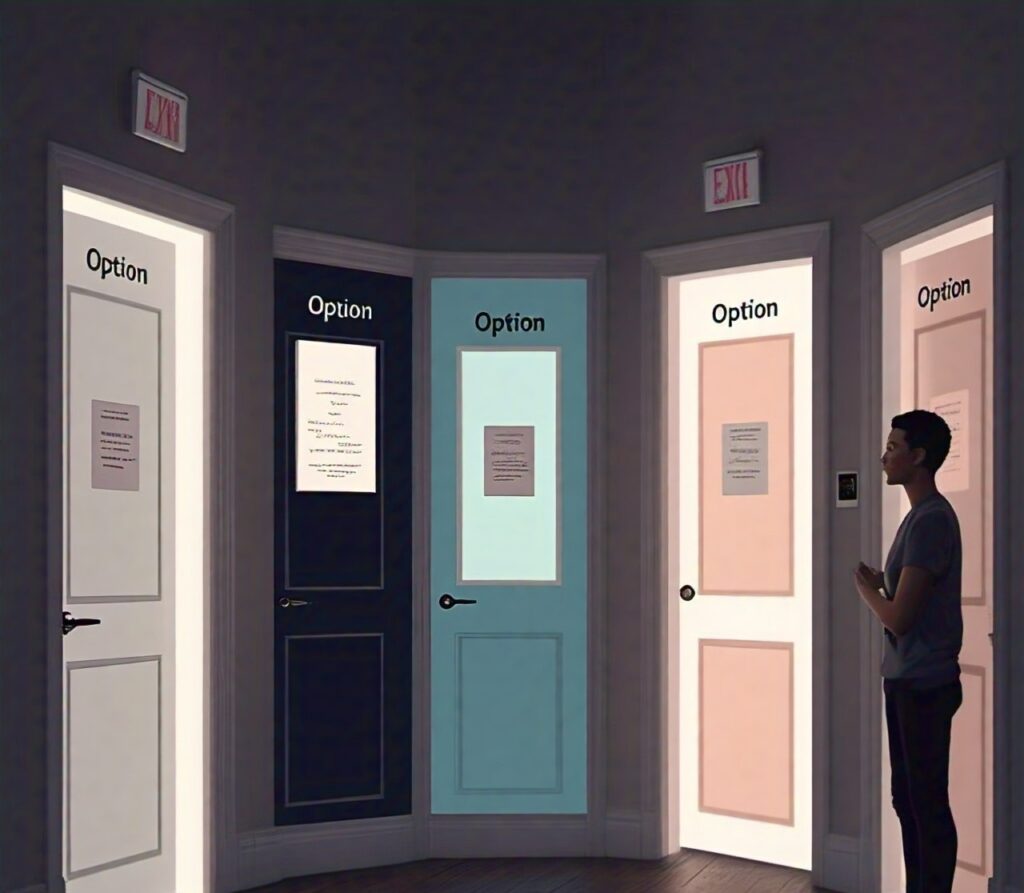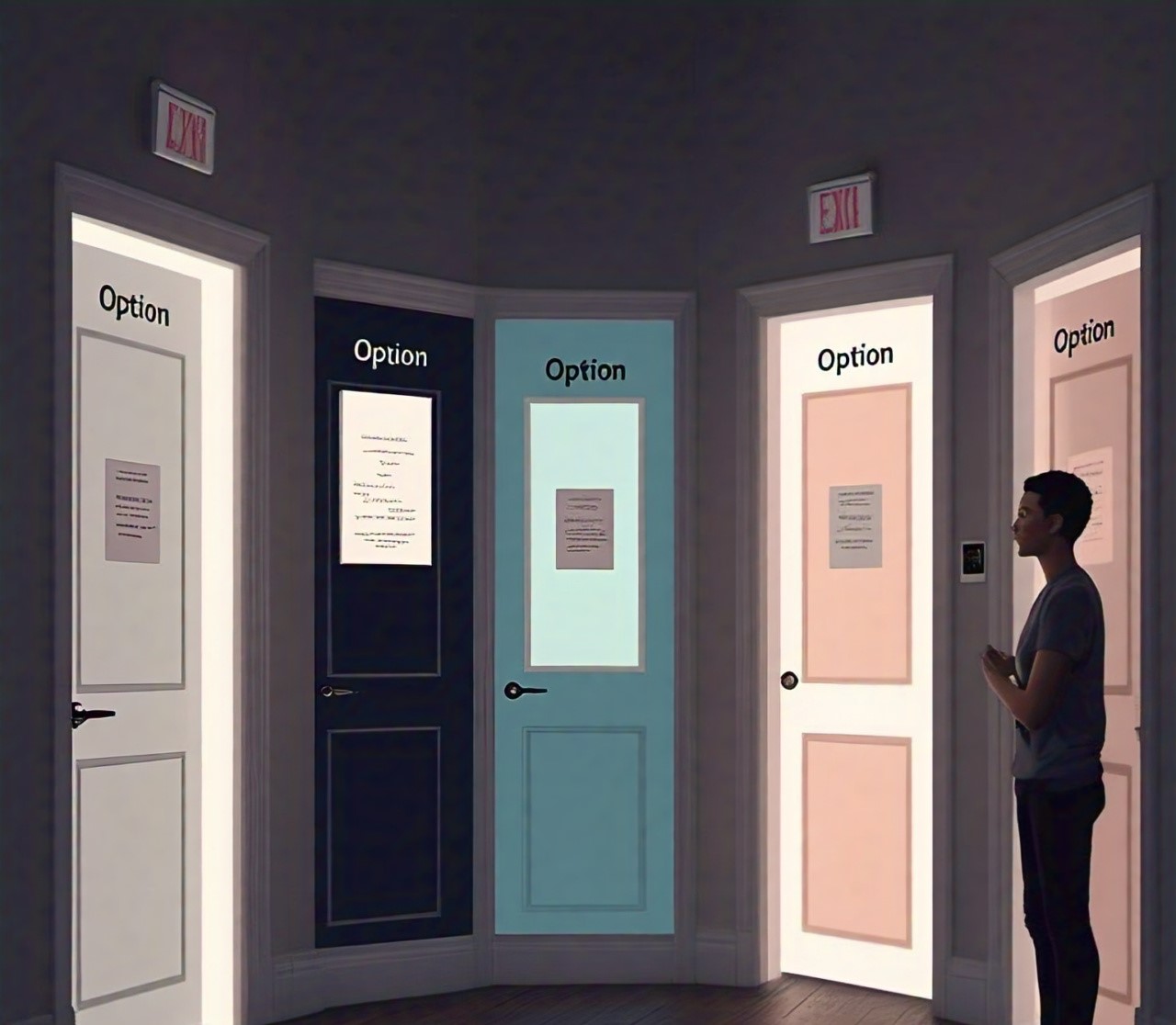Have you ever been to an establishment and lost it because there was such a wide variety? Or what about the other way around? If you’ve ever entered a restaurant, looked at the menu, and then thought to yourself, “Wow, this will be a lot more difficult than I expected,” you’re not the only one. According to cognitive psychology, the sheer number of options appears overwhelming. One of the fundamental guidelines to keep at the forefront of your mind when it comes to marketing and advertising is the illusion that there is a choice.
For years, cognitive psychologists have recognized that humans don’t enjoy the prospect of having too many options with very little distinction between them. Numerous choices can result in anxiety, confusion, and sometimes even unhappiness.
What is The Illusion of Choice?
A false sense of freedom is a psychological bias that leads people to believe that they can make better choices than they really do or believe that other people’s choices do not influence their choices.
The reality is that it’s more complex. The illusion of freedom creates an illusion of control, resulting in poor decision-making. What, then, and how can you choose?
It depends on the type of decision you’re making and the importance of each option. However, generally, you have too many options when:
- You’ll spend more time deciding which one to choose than actually doing other things with your time.
- It’s difficult to decide between three or two options (which are all similar) because you’re constantly considering other options.
- It is difficult to look at your options since it is so difficult to determine the differentiators between them.
This illusion of choice is evident throughout the world in areas such as politics, business, as well as consumer products. Here are a few examples:

- The most famous example of the illusion of choice is selecting among different soda brands. The options are the same. However, people usually choose based on colour and labels rather than on tasting.
- In the world of politics, it is believed that the concept of choice is evident throughout the election cycle. The major parties typically have identical candidate and policy positions, which means that many voters believe they are left with no choice other than to choose either one of them.
- This is also evident in games that make players feel as if they’re making decisions, but they’re actually being pushed into certain paths or outcomes by the developers who require them to perform certain actions or play in specific ways.
The Illusion of Choice and Capitalism
Capitalism is based on the notion that people ought to be in control of their own lives and choose what they do with their lives. However, psychologists contend that this idea of freedom is a myth because corporations continuously influence us with their advertising and marketing. They also say, “We have a society in which people are constantly being told what they want before they are aware of what they’d like.”
Consumers think they can choose what they buy and how the money goes. But that’s not always the case. Certain businesses only sell one service or product, and others offer a variety of products and services with no distinction beyond marketing strategies.
It is a false sense of freedom that provides customers with the illusion of making an informed choice about what they should buy or where they should spend money. However, it’s not always leading to the most beneficial result for society or the individual.
One excellent example is fast-food establishments which claim to provide a variety of burgers, fries, and drinks -all in the same chain. However, they offer a limited selection of choices since the majority of items are similar in small differences like size or cost. The menu may appear to be extensive at first sight. But, when you take a closer look at the choices available in every category, you’ll find yourself selecting from a limited range of options that are only slightly different from each other in regards to taste or quality.
This illusion can also be used to prevent people from questioning the status quo. If people believe they can choose, they are less likely to challenge the system that grants them the choices.
This leads to a false perception of democracy and freedom which eventually benefits an elite class at the expense of the people of the working class.
The Illusion of Choice vs. Desirability Bias
The illusion of choice, as well as the desirability bias, are two of the phenomena that can be seen in a variety of ways. It is believed that the illusion of choosing is created when people think they have plenty of choices when they have very few choices in actual reality.
The desirability bias occurs in the belief that something is good because they want it to be good, even if it isn’t.
Both of these illusions can result in poor decision-making as well as behaviour. They can lead people to make decisions based on vanity or false information instead of reasoning or logic. The reason for this is that the person believes that their decision has greater value than other choices (even when it’s not). This causes them to choose which is believed to be the most beneficial option for them, even if it’s not necessarily the most suitable choice for them!
Another similarity between these two phenomena is that both can be seen in diverse contexts, ranging from elections in the political arena (illusion of choosing) to everyday purchases (desirability biased).
Causes of The Illusion of Choice
Many factors can contribute to the illusion of choice:
- Unlimited possibilities
- Incorrect information about the various options
- The failure to understand the distinctions between options
- The way in which information is displayed (e.g. the way information is presented, people tend to choose the first thing they see)
- How people are grouped (e.g. If you’re in a group with people who have taken a specific choice and you’re less likely to make a different one)
Researchers also discovered that people were more content with their purchases when presented with fewer options. This finding has come to be known as the paradox of choice.
Signs of Problematic Decision-Making Related to The Illusion of Choice
There are various ways to define an illusion created by choice, but the most important aspect is that it may indicate trouble in making decisions.
Complex decision-making based on the illusion of choices can lead to thinking you have more choices than you actually do. This can result in confusion and procrastination. It can also lead to increased worry and doubt.
There are some indications that you could have issues with decision-making due to the illusion of choices.
- You’re feeling pressured to make the best decision.
- You are apprehensive about each decision, whether big or small.
- You feel like you have an unlimited number of options.
- You feel overwhelmed by the choices you make
- You often second-guess your choices.
Types of the Illusion of Choice
There are two kinds of illusions of your choice:
A false perception of control
This false belief is when people think they are more in control of their life than they really are. This can result in poor decision-making because people might choose options that are not in their best interests.
A paradox in the choice
The paradox of choice type is when people are offered numerous options, which results in them not feeling content with their choice. This happens most often when people are overwhelmed by options and are unable to narrow their choices.
Practical Applications of the Illusion of Choice
This illusion is commonly employed in marketing and advertising to create the impression that people are very much in control of their purchase decisions. Similar techniques can be employed during political elections to help voters feel more secure in their decision of which candidate to support.
The reality is that the perception of freedom can be an illusion of control that could cause people to make choices based on insufficient data.
Companies That Offer Free Trials
The illusion of choice can also be used to manipulate people into making decisions. For instance, a company could offer a “free trial” that automatically enrols a client in a monthly subscription if they don’t change their mind within the trial.
The consumer may think they control their choice to sign up; however, in the real world, they are affected by the actions of the company.
Impact of the Illusion of Choice
It is believed that the illusion of choice could be a major influence on the lives of people. It can result in poor decision-making and feelings of frustration and stress.
A false sense of freedom may be used to influence individuals into making choices which aren’t beneficial to them. For instance, a company might employ an email campaign for marketing to force customers into purchasing an item. The email may provide the prospect of a limited-duration, discount that will expire soon and may include a countdown clock that creates urgency.
How to Create The Illusion of Choice in Your Marketing Strategy
You’ll be able to see a clearer picture of what the illusion of choice may look like and how it works. With this in mind, we’ll look at the ways that you can use this strategy to benefit your business.
Make Suggestions in Order to Avoid the ‘Zero’ Option
Like making minor tweaks in your vocabulary, you could make suggestions to create the illusion of choice. In the end, you do not want your client to begin to wonder why they are required to make all the choices.
In reality, this could mean utilizing your knowledge to assist your clients. If you are aware of something that could be useful, then you can incorporate it into the choices you offer. For instance, instead of repeating that a client wants 50 crates of red wine, make suggestions to create the appearance of a choice.
When you ask, “Will 50 crates be enough, or do you wish to secure 70 crates for a discounted price?” you’re opening up an opportunity for the buyer to think about the issue. Also, you’ve posed some doubts and provided another option that could help the customer and certainly you.
Create Win-Win Situations by Altering Your Language
Rephrasing some of the language you use with customers can quickly create an illusion of choice. You want your copy to provide possibilities or openings instead of dead endings.
Instead of contacting leads whenever they’d like to schedule an appointment, give them options by suggesting two dates that you consider convenient. If you also make it clear that you’ll be able to accommodate another convenient time, then you’ve eliminated the possibility of a “no”.
It is a good idea to use this approach even in digital settings. You can apply this technique when you are developing chatbots to aid in the conversion of leads or to retain customers. With branching responses, even your automated system could create an illusion of choosing.
Read More: The Most Powerful Paradoxes of Life
Read More: Objective And Subjective Reasoning: How It Affects Our Decisions
Read More: Domestic Discipline is Domestic Abuse
Tips to Overcome The Illusion of Choice
Unsurprisingly, many of us have a hard time making decisions in our everyday lives. How can we increase our decision-making abilities? There are some steps to make better choices and live our lives.
Determine your objectives
Defining your goals will allow you to narrow your options and make it easier to determine which option is right for you.
Make your choices simpler
Making your choices simpler can make you feel less overwhelmed by the options that are in front of you.
Create a list of both pros and cons
A list of pros and cons can help determine your options and make an informed decision.
Seek input from others
Getting input from other people can provide you with an alternative perspective on your choices and can aid you in making a more informed choice.
Trust your gut
The ability to trust your intuition can be beneficial when being overwhelmed by your options. Sometimes, the most effective decision is one that is most comfortable for you.
Control Your Bias
Be aware of your personal biases and tendencies when you make decisions. Your biases can cause you to make bad decisions.
A cognitive bias refers to a mistake in cognition when personal beliefs influence a person’s reasoning. Cognitive biases are a part of our thinking and are often unconscious. Understanding how your mental processes work is the first step toward making better and more informed decisions.
Cognitive biases are preconceived ideas about someone or something that we base on the information we have, perceive to have, and lack. These mental shortcuts help the brain quickly process information and make sense of what it sees.
Continue Reading: How Cognitive Biases Influence How You Think And Act
Don’t rush
Make sure to take time to think about every option before making an important decision. Making a quick decision could cause regret later.
Consider the risk
Be aware of the possible cost and risks associated with your choice.
Conclusion
It is true that the illusion of choice is an effective way to control and manipulate individuals. It is crucial to recognize your personal preferences and biases in making decisions. Make sure to think about every option before making a decision. Be aware of potential risks and the costs that come with your options. Consider a variety of opinions prior to making a decision. Don’t forget to consider your intuition and instincts in making decisions.



